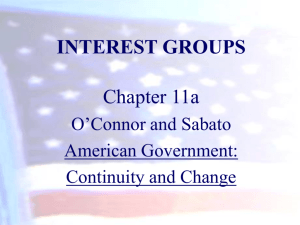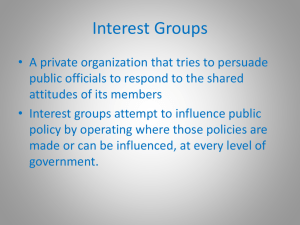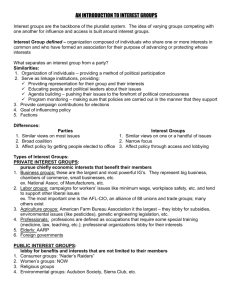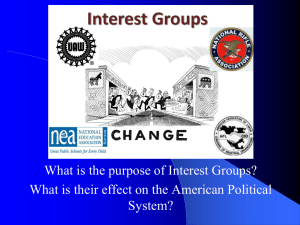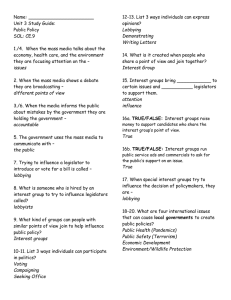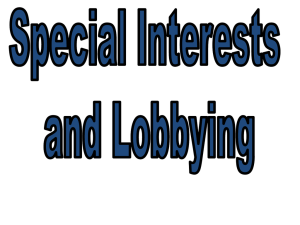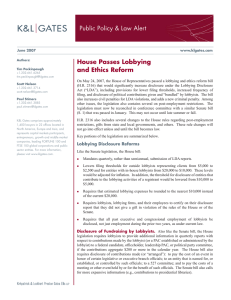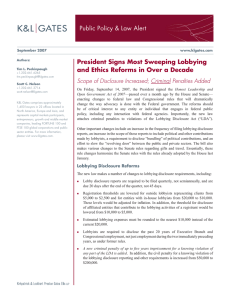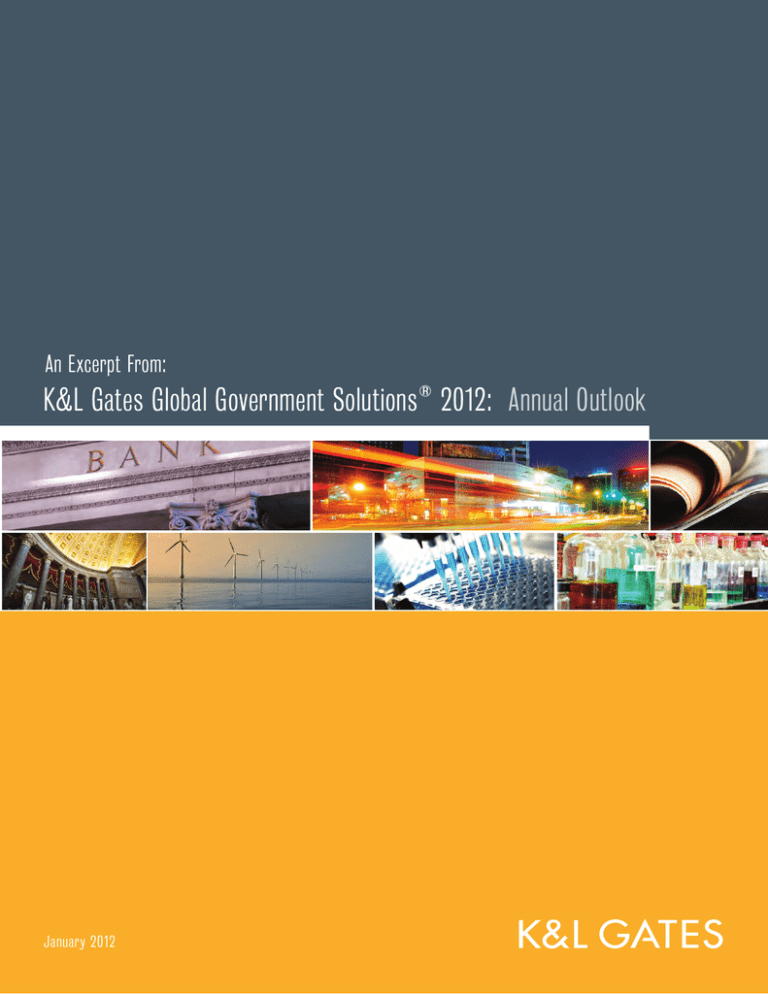
An Excerpt From:
K&L Gates Global Government Solutions ® 2012: Annual Outlook
January 2012
Politics and Policy
Will UK Lobbyists be Required to Register?
It was in October 2011 that the
UK Coalition Government faced its
second major Cabinet resignation,
after less than 18 months in office.
(The first Cabinet resignation occurred
within two weeks of the Coalition
government being formed.) On this
occasion, Secretary of State for
Defense Liam Fox resigned over his
links with his friend and advisor Adam
Werritty. Questions were raised about
Mr. Werritty’s having accompanied
Dr. Fox on a number of overseas visits
and issuing business cards erroneously
suggesting that he had an official
advisory position. Those who had
funded research bodies set up by Dr.
Fox were purportedly unaware that
many of their contributions were used
to fund Mr. Werritty’s own expenses.
Following Dr. Fox’s resignation, David
Cameron, the British Prime Minister, took
the opportunity to repeat his pledge to
introduce a mandatory statutory register
for lobbyists. Mr. Werritty actually never
acted as a lobbyist in this role, so whilst
this was a great opportunity to knock
lobbyists in general, it actually had no
real relevance to the scandal that led to
Dr. Fox’s resignation.
Lobbyists are easy “knocking fodder” in
opposition. All political parties (especially
those in opposition) believe in complete
transparency. When he was Leader of the
Opposition, Mr. Cameron several times
pledged to tackle lobbying, stating that
it was “the next big scandal waiting to
happen” and had “tainted our politics for
too long…” and he wanted politics to “…
come clean about who is buying power
and influence.”
Greater regulation of lobbyists was a
manifesto commitment by both governing
K&L Gates Global Government Solutions ® 2012 Annual Outlook
79
Politics and Policy
Greater regulation of lobbyists was a manifesto
commitment by both governing parties and features
in the Coalition Agreement.
parties and features in the Coalition
Agreement (that was the agreement
between the Conservatives and the
Liberal Democrats which led to the
formation of the Coalition government).
The Coalition government planned
to introduce a consultation paper on
lobbying by the end of November 2011.
Latest indications from the Cabinet
office are that a consultation paper may
materialize in early 2012. Even so,
there are many different views about the
operation of a mandatory registration
scheme, and the prospects are that any
legislation is unlikely to come into force
until the 2013/14 Parliamentary session.
Lobbyists in the UK have tried to head
off statutory-based regulation by setting
up their own self-regulating body
called the UK Public Affairs Council,
an umbrella body consisting of three
key industry trade associations. On
December 9, 2011 one of those three
trade associations withdrew from this
body. The UK PAC was intending to
establish a voluntary register of interests,
but their failure to agree amongst
themselves is not at all promising and
makes the prospect of statutory regulation
all the more likely.
On December 6, 2011 “The
Independent” reported a claim by
senior officials at a leading UK public
80
affairs agency that they could secure
direct access to senior members of the
government. Their managing director
was recorded as saying “we’ve got all
sorts of dark arts...he couldn’t put them
in the written presentation because it’s
embarrassing if it gets out.”
It is therefore not terribly surprising
that the good intentions behind the
establishment of the UK PAC appear to
have failed.
What will the new register require? Will
it be lobbying firms or individual lobbyists
that have to be registered? How do you
define a “lobbyist” for these purposes?
Will they have to record every single
meeting and proposal or will the register
be more generic? Will the register have
to include law firms? The European
Commission and the European Parliament
have recently jointly launched their own
voluntary register, which might provide
the UK government with an interesting
model. Whether or not an organization
should register depends on whether or
not they or their members are involved
in “directly or indirectly influencing the
formulation or implementation of policy
and the decision-making processes of
the EU Institution.” Registration does
bring advantages, such as access to
the European Parliament’s premises.
However, the downside of registration
K&L Gates Global Government Solutions ® 2012 Annual Outlook
is a requirement to disclose details of
annual turnover, resources devoted to
lobbying activities, and potentially the
names of clients.
In the UK, the terms “lobbyist” and
“lobbying” are deeply unattractive
and somewhat derogatory of a valued
industry that has an important and
effective democratic function. As is
always the case, it is the actions or
statements of a few that cause so much
damage to the whole. The government’s
determination to regulate becomes
stronger every time that a consultant
claims (with or without any justification)
that he can influence those in government
(whether national or local). Whether
there is actually an appetite within the
Coalition government to carry through
the statutory register remains to be seen.
So much has happened in the last few
months, and the UK government seems to
have far greater priorities at the moment.
Maybe a statutory register will still only
be a promise when the political parties
are campaigning again at election time
in 2015.
Piers Coleman (London)
piers.coleman@klgates.com
Anchorage Austin Beijing Berlin Boston Brussels Charleston Charlotte Chicago Dallas Doha Dubai Fort Worth Frankfurt Harrisburg
Hong Kong London Los Angeles Miami Moscow Newark New York Orange County Palo Alto Paris Pittsburgh Portland Raleigh
Research Triangle Park San Diego San Francisco São Paulo Seattle Shanghai Singapore Spokane Taipei Tokyo Warsaw Washington, D.C.
K&L Gates includes lawyers practicing out of 40 offices located in North America, Europe, Asia, South America,
and the Middle East, and represents numerous GLOBAL 500, FORTUNE 100, and FTSE 100 corporations, in
addition to growth and middle market companies, entrepreneurs, capital market participants and public sector
entities. For more information about K&L Gates or its locations and registrations, visit www.klgates.com.
This publication is for informational purposes and does not contain or convey legal advice. The information herein should not be used or relied upon in regard to
any particular facts or circumstances without first consulting a lawyer.
©2012 K&L Gates LLP. All Rights Reserved.




